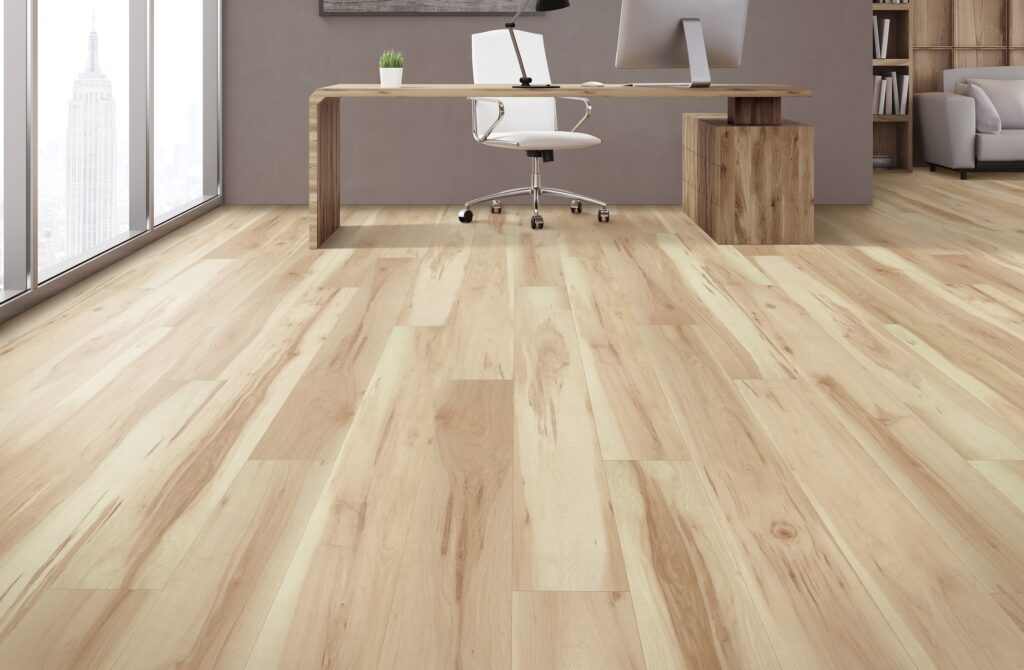What Is Vinyl Flooring Advantages & Disadvantages
Vinyl flooring, also known as resilient flooring or PVC vinyl flooring, is a popular flooring option for both residential and commercial spaces. It consists of artificial and natural polymeric materials arranged into repeating structural units. Vinyl flooring is a product made up of multiple layers of different materials to form a highly durable floor covering. Vinyl floor tiles or vinyl floor coverings are both affordable and aesthetically pleasing.
Vinyl tiles come in plank and tile forms and are typically manufactured to replicate natural hardwood or ceramic tile floors. They are self-adhesive with a peel-and-stick mechanism and are easy to install.
Also read: Vinyl flooring Ideas for your kitchen
Vinyl flooring is a popular flooring choice for many people for a variety of reasons. It is durable, easy to clean, and available in more than one color and style. Here are some things to consider when choosing vinyl flooring for your home.

Advantages
Easy Maintenance
Vinyl floors are easy to clean and maintain. Vacuuming and mopping are the easiest ways to keep your vinyl floors clean. But don’t use a bristle mop with a built-in scrub. It is scratch resistant but not 100% image safe. Vinyl floors extremely stain resistant thanks to an abrasion layer that protects the floor covering from stains. A mild detergent mixed with warm water can be used to remove stubborn stains from vinyl floors.
Versatile and Durable
Vinyl flooring is a long-lasting material that is worth every cent of investment. There are some providers offering warranties of up to 20-25 years, making them very durable. There are also no signs of wear as the material is scratch resistant and won’t crack or crack like wood or ceramic floors.
Water Resistant
Vinyl flooring is made from a synthetic material, so it is naturally resistant to water. This makes it a great choice for rooms in your home that are prone to spills or moisture, such as kitchens and bathrooms. Plus, vinyl flooring is easy to clean and maintain, so you won’t have to worry about water damage over time.
Affordable
Affordable and easy way to update the flooring in your home. Especially when replacing an entire floor in a large house with many rooms. An easy way to save on renovation costs. However, there is no compromise on quality as the materials are long-lasting.
Design
Vinyl flooring is also available in a variety of colors and styles. You can choose the design that matches the style of your home. This means that you can find vinyl flooring that matches your home’s décor and fits your personal taste. It also mimics wood and stone surfaces, making it difficult to tell the difference between vinyl tiles and natural surfaces.
Comfortable to walk on
Vinyl sheets and tiles have a cushioning layer, so vinyl floors are soft underfoot. Vinyl floors also have a certain elasticity. In addition, since the vinyl sheet has a soft surface, it does not easily break even if something is dropped on it.

Disadvantages
Vinyl flooring is a popular choice for many homeowners, but it does have a few disadvantages.
Discoloration
Vinyl is prone to fading when exposed to sunlight for an extended time and can be damaged by the foot traffic that occurs in homes. It’s also not as durable as hardwood floors or tile. Vinyl flooring is not recommended for places that are under direct sunlight such as verandas.
Sub- Floor Damages
For vinyl floors, it is important that the work surface is perfectly smooth and level. Because vinyl floors are relatively soft, even small particles trapped under the floor can wear down the material over time and cause the surface to bulge.
Toxic Releases
Vinyl floors are made of chemicals that can harm the environment and cause respiratory and eye problems.
Possible damages and dents
Dragging heavy and sharp objects on the floors may result in dents. Broken vinyl tiles or panels cannot be repaired. Therefore, they should be replaced with new ones.


